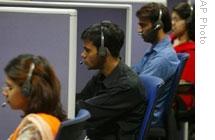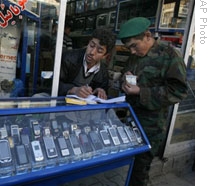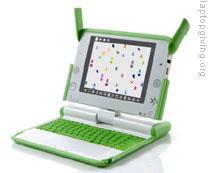VOA慢速英语-EXPLORATIONS - Technology Increases Income, Reduces
搜索关注在线英语听力室公众号:tingroom,领取免费英语资料大礼包。
(单词翻译)
The spread of cell phones, computers and other technology has increased economic growth in the developing world. Transcript1 of radio broadcast:
01 July 2008
VOICE ONE:
I'm Barbara Klein.
VOICE TWO:
And I'm Steve Ember with EXPLORATIONS in VOA Special English. Today we tell about how technology is improving the lives of people in developing countries.
(MUSIC)
VOICE ONE:
Musa Kayairanga of Rwanda is a traditional healer. He uses natural medicines to treat his patients. He learned how to use computers at a rural telecommunications center in his country. Musa Kayairanga says he exchanges information with doctors as far away as Canada. He also says the computer has improved his knowledge of using plants to treat diseases.
Many people in rural areas are now able to communicate with the rest of the world. This is one example of how technology is changing life in developing countries.
VOICE TWO:
 |
| A call center in Bangalore, India |
Andrew Burns is an economist3 at the World Bank in Washington, D.C. He led a recent study of technology in developing countries. The study found that technology has spread faster in such countries than in rich nations. It also found that technological4 progress has helped raise wages in developing countries. And it reduced the percentage of people living in extreme poverty from twenty-nine percent in nineteen ninety to eighteen percent in two thousand four.
VOICE ONE:
Progress in communications technology has aided the growth of call centers in developing countries. Call centers are offices where most telephone calls for a business can be answered. For example, a woman in the United States who calls her computer company about a problem might speak with someone in India or Pakistan.
Call centers serve businesses in local and international markets. And they have added to economic growth by providing well-paid jobs and new skills for workers who might not have had such employment.
Ahsan Saeed is a young call center worker in Karachi, Pakistan. He says the job improves his language skills, his sales skills and his ability to deal with people.
VOICE TWO:
Experts say the wireless5 telephone has changed lives and businesses more than any other device. Eighty percent of the world's population now lives in an area covered by at least one cell phone network. Arthur Molella heads the Lemelson Center for the Study of Invention and Innovation at America's Smithsonian Institution. He says cell phones are having many effects. One effect is increasing communications from countries with strong rulers.
For example, when governments repress their opponents, the world knows about it almost immediately because of cell phone pictures and videos placed on the Internet. This has helped increase international pressure against such governments.
VOICE ONE:
Yet experts say the spread of technology in the developing world will not necessarily produce the same kind of progress or wealth as in rich nations. Arthur Molella says technology is being used in different ways in developing countries.
Cell phones are an example of what is sometimes called "leapfrog" technology. This is a kind of technology that is not based on earlier technology. For example, many people in developing countries have gone from no telephones to wireless communications.
Cell phones permit developing countries to have a good communications system without the heavy investment of fixed6-line telephone technology.
VOICE TWO:
In Afghanistan, Abdul Wakil owns a store in a village about forty kilometers north of the capital, Kabul. He says his cell phone has been important for his business. In the past, he had to go to Kabul to order products. Now he can do that with a phone call.
 |
| An Afghan shopkeeper sells a soldier a cell phone in Kabul |
The International Telecommunication2 Union says cell phone signals are able to reach seventy-two percent of Afghanistan's population. By comparison, fewer than one percent of the population has a fixed telephone line.
VOICE ONE:
Cell phone use worldwide has increased as more countries have opened their state-owned telephone systems to let private companies build cellular7 networks. By the end of two thousand six, sixty-eight percent of the world's cell phone users were in developing countries.
Andrew Burns of the World Bank says one reason for the spread of cell phones is ease of use. He says a person does not have to be able to read or know mathematics to use such devices.
VOICE TWO:
Using a cell phone gives a person more power. For example, using cell phones for financial activities is becoming popular in countries where many people do not keep their money in banks.
In Kenya, a low cost cell phone service called M-Pesa lets people send and receive money by using text messages. The service is popular because people do not have to travel long distances to make payments or receive money.
VOICE ONE:
Cell phones are also proving to be an important tool in health care. They are helping8 to halt the spread of diseases such as AIDS. In Rwanda, health care workers in rural medical centers use cell phones that have a special software program. An American company, Voxiva, developed the program. The software lets health care workers enter information about medicines and patients in cell phones. Then they can send this information by text messages to health officials in Rwanda's capital. With this information, the workers can better supervise the spread of AIDS and send resources to medical centers to treat the disease.
(MUSIC)
VOICE TWO:
Low technology is also important in developing countries. Low-tech inventions can help people improve their quality of life. Two examples are water-cleaning devices and stoves that use a small amount of fuel. This is called "appropriate technology." It usually requires fewer resources than high technology. It also is less costly9 and easier to operate. And it does not harm the environment.
VOICE ONE:
Leonidas Simbizi is a soldier in Burundi. He cooks his meal at an army base in Bujumbura. His stove uses the plant material peat instead of wood for fuel. However, he says the stove produces a lot of smoke. Burundi's government wants people to use peat instead of traditional fuels. Peat is easy to get and its use can save trees from being cut down.
Burundi's army is the main user of peat stoves. But the country plans to sell peat stoves to civilians10, too.
VOICE TWO:
In Cambodia, about one hundred thousand homes have ceramic11 water purifiers. These devices remove microorganisms and other substances, making water safe to drink. The American non-profit group International Development Enterprises has supported the use of the low-tech purifiers.
Cambodians like Lach Emmaly are very satisfied. She says she finds the device useful because she does not have to search for firewood to make a fire to heat water. She says the water purifier saves her time and money, and keeps her healthy.
VOICE ONE:
 |
| The XO laptop from the One Laptop Per Child project |
Even high-technology products, like computers, can be changed to fit local conditions. One example is the One Laptop Per Child project. An American non-profit group with the same name started the project. The laptop computers are light in weight. They can use energy from the sun or can be hand-powered. Children and their teachers are able to use computer software that meets their needs.
Nicholas Negroponte is the chairman of the One Laptop Per Child Foundation. He says the special laptop is an example of appropriate technology. He says it uses only one twentieth of the power of laptops used in the United States.
(MUSIC)
VOICE TWO:
New technology is also helping farmers. Years ago, farmers in India's Uttar Pradesh state sold their wheat to local dealers12 at whatever price was offered. Now, thanks to the Internet, they can get higher prices for their crops.
In Uttar Pradesh and other states, farmers can go to a center with Internet connections. They are able to use a system, known as e-Choupal, set up by the Indian Tobacco Company. They can get price information and sell their crops on the Internet. They can also get information about the weather so they will know the right time to use chemicals to kill insects. More than six thousand Indian villages are connected to the e-Choupal network. This is another example of how technology is changing the lives of people in developing countries.
(MUSIC)
VOICE ONE:
This program was written by Shelley Gollust. Our producer was Mario Ritter. I'm Barbara Klein.
VOICE TWO:
And I'm Steve Ember. You can read scripts and download audio at our Web site, voaspecialenglish.com. Join us again next week for EXPLORATIONS in VOA Special English.




